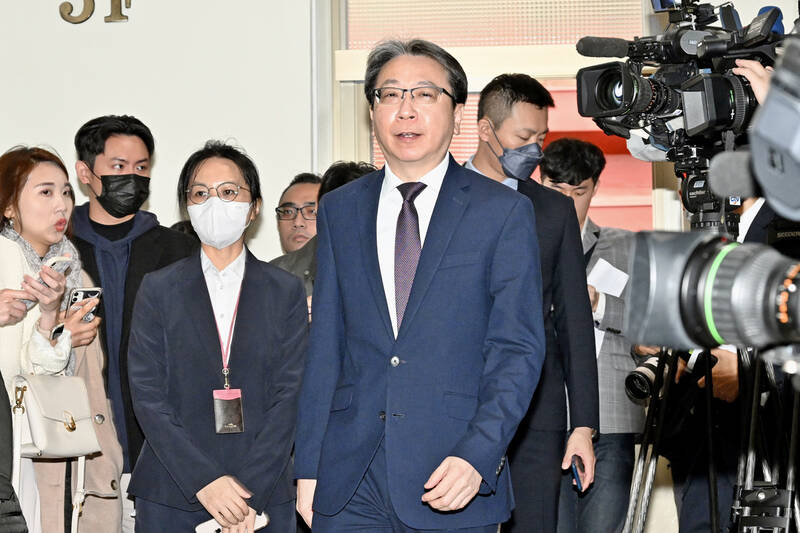Taiwan maintains “real-time” intelligence sharing with the Five Eyes alliance of the US, the UK, Canada, Australia and New Zealand, National Security Bureau (NSB) Director-General Tsai Ming-yen (蔡明彥) said yesterday.
Tsai made the remark during a legislative session in Taipei after a lawmaker asked if Taiwan had such exchanges with the group.
Chinese Nationalist Party (KMT) Legislator Charles Chen (陳以信) said he had discovered that the NSB had been upgrading its computer equipment last year and this year “to the level of those used by intelligence units in foreign countries.”

Photo: George Tsorng, Taipei Times
Chen asked Tsai if the upgrades could help Taiwan better connect to the Five Eyes.
The bureau had allocated funds to establish an “instant online reporting and communication mechanism” with foreign nations, Tsai said.
Chen asked if the upgrade would enable the bureau to share and receive intelligence from the Five Eyes alliance.
Tsai said that the NSB would do so via “a secure and encrypted system.”
Chen asked if the bureau was already sharing intelligence with the Five Eyes, to which Tsai said: “Yes, and in real time,” without elaborating.
Tsai reported to lawmakers what measures the bureau was taking to prepare for next year’s presidential and legislative elections, including its efforts to counter anticipated efforts by China to interfere in the vote.
Asked whether the NSB has a response to China’s attempts to expand its sphere of influence abroad, Tsai said that if a case arises that is strong enough to be prosecuted, it would be handled by the appropriate agency.
However, China’s tactics differ in Taiwan from other places such as the US and Europe, he added.
Beijing has allegedly established secret overseas “police stations” that US and other nations believe are tasked with collecting information on people who criticize the Chinese Communist Party.
Beijing denies the allegations.
Cases of Taiwanese being detained in China have also come to light recently, including reporters filming Chinese People’s Liberation Army exercises earlier this month and Gusa Press (八旗文化) editor-in-chief Li Yanhe (李延賀), also known ask Fucha (富察), who was detained in Shanghai last month.
Lawmakers also expressed concern that Beijing has stepped up its monitoring of and threats toward Chinese living in Taiwan.
Beijing would not dare set up one of its “police stations” in Taiwan, but it could work through third parties to monitor or manipulate Chinese and their partners, as well as Taiwanese with businesses in China, Democratic Progressive Party (DPP) Legislator Lo Chih-cheng (羅致政) said.
Tsai said there is no doubt that this is happening, but the bureau can only keep close watch for any contraventions of the law.
If any are found, it would transfer the case to prosecutors, he said, adding that there are some cases being investigated.
The bureau’s role is to collect and share intelligence with other agencies about potential Chinese interference, he said.
This is different from how China operates in other countries, where it can set up physical workstations or travel agencies, he added.

A magnitude 5.6 earthquake struck off the coast of Yilan County at 12:37pm today, with clear shaking felt across much of northern Taiwan. There were no immediate reports of damage. The epicenter of the quake was 16.9km east-southeast of Yilan County Hall offshore at a depth of 66.8km, Central Weather Administration (CWA) data showed. The maximum intensity registered at a 4 in Yilan County’s Nanao Township (南澳) on Taiwan’s seven-tier scale. Other parts of Yilan, as well as certain areas of Hualien County, Taipei, New Taipei City, Taoyuan, Hsinchu County, Taichung and Miaoli County, recorded intensities of 3. Residents of Yilan County and Taipei received

Taiwan has secured another breakthrough in fruit exports, with jujubes, dragon fruit and lychees approved for shipment to the EU, the Ministry of Agriculture said yesterday. The Animal and Plant Health Inspection Agency on Thursday received formal notification of the approval from the EU, the ministry said, adding that the decision was expected to expand Taiwanese fruit producers’ access to high-end European markets. Taiwan exported 126 tonnes of lychees last year, valued at US$1.48 million, with Japan accounting for 102 tonnes. Other export destinations included New Zealand, Hong Kong, the US and Australia, ministry data showed. Jujube exports totaled 103 tonnes, valued at

TRUST: The KMT said it respected the US’ timing and considerations, and hoped it would continue to honor its commitments to helping Taiwan bolster its defenses and deterrence US President Donald Trump is delaying a multibillion-dollar arms sale to Taiwan to ensure his visit to Beijing is successful, a New York Times report said. The weapons sales package has stalled in the US Department of State, the report said, citing US officials it did not identify. The White House has told agencies not to push forward ahead of Trump’s meeting with Chinese President Xi Jinping (習近平), it said. The two last month held a phone call to discuss trade and geopolitical flashpoints ahead of the summit. Xi raised the Taiwan issue and urged the US to handle arms sales to

BIG SPENDERS: Foreign investors bought the most Taiwan equities since 2005, signaling confidence that an AI boom would continue to benefit chipmakers Taiwan Semiconductor Manufacturing Co’s (TSMC, 台積電) market capitalization swelled to US$2 trillion for the first time following a 4.25 percent rally in its American depositary receipts (ADR) overnight, putting the world’s biggest contract chipmaker sixth on the list of the world’s biggest companies by market capitalization, just behind Amazon.com Inc. The site CompaniesMarketcap.com ranked TSMC ahead of Saudi Aramco and Meta Platforms Inc. The Taiwanese company’s ADRs on Tuesday surged to US$385.75 on the New York Stock Exchange, as strong demand for artificial intelligence (AI) applications led to chip supply constraints and boost revenue growth to record-breaking levels. Each TSMC ADR represents